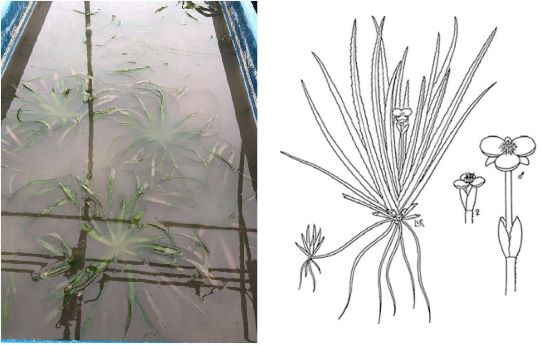Home → Water Quality → Monitoring → Invasives → Water Soldier
Water Soldier
Stratiotes aloides

Photo: Chase Kilgore – SePro. Drawing: IFAS Centre for Aquatic Plants, University of Florida, Gainsville, 1990.
Description
Water soldier, also known as water pineapple and water aloe, is a perennial aquatic plant with sharply serrated leaf edges and is native to Europe and Asia. It is often used as an ornamental plant and, if released into the wild, could threaten aquatic ecosystems in the northeast US. The leaves resemble pineapple or aloe leaves, forming a rosette of green leaves 40 cm long (15 inches), sword-shaped, with sharp spines. In autumn the leaves of the plant secrete a substance that allows it to sink below the water to the bottom of the lake/pond, where it will stay dormant over winter before rising to the surface in spring. S. aloides produces separate plants with male or female showy, white, three-petaled flowers. Male plants usually have 3-6 flowers, with female plants containing one or two buds. Female plants can have 1 to 3.5 cm (less than an inch to an inch) long fleshy berries containing up to 24 seeds. Fruits and seeds are rarely produced, and mature plants most often produce clones that increase the spread, much like spider plants. The roots of S. aloides are small and not permanently attached to the substrate. Plants can grow in water depths of up to 5 meters (15 feet), or at the depth the light penetrates.
General Information
S. aloides can form dense mats of floating vegetation that can inhibit native aquatic vegetation and decrease biodiversity. The plants’ sharp serrated leaf edges can cut swimmers and individuals that try to pull or remove the plants. The dense floating mats of vegetation can negatively affect boating, angling, and swimming.